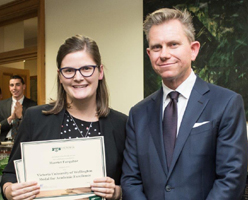Law graduate awarded prestigious Medal for Academic Excellence
Harriet Farquhar spent more time than most on the stage at today’s graduation ceremony.
 Harriet Farquhar spent more time than most on the stage at today’s graduation ceremony. In addition to graduating with a Bachelor of Laws with First Class Honours and a Bachelor of Arts, majoring in English Literature, she was also awarded the prestigious Victoria University Medal for Academic Excellence and she delivered a formal speech on behalf of all the graduates.
Harriet Farquhar spent more time than most on the stage at today’s graduation ceremony. In addition to graduating with a Bachelor of Laws with First Class Honours and a Bachelor of Arts, majoring in English Literature, she was also awarded the prestigious Victoria University Medal for Academic Excellence and she delivered a formal speech on behalf of all the graduates.
To qualify for the Medal for Academic Excellence, a graduate must have been awarded the degree with First Class Honours, have a record of exceptionally high academic achievement across four or more years of study, and be recognised as the top scholar in their degree in the year of the award. The medal is not awarded unless these exceptionally high standards of achievement are met.
Commenting on what it takes to be that student Harriet says, “Let’s just say I became very, very familiar with the law school library!”
That has paid off in many ways and Harriet is now working at the Supreme Court in a coveted role, as a Judge’s Clerk to the Honourable Justice Sir Terence Arnold.
Yet studying Law was not always Harriet’s first choice.
“It was the suggestion of my careers advisor at school,” Harriet says. “I knew that I wanted to study for a BA in English literature and art history, and she suggested I try law as well.
“For the first few years of law school I was still somewhat unsure about whether it was for me, but once I had the opportunity to follow my personal interests in the 300 level electives and in the honours programme, I became sure that it had been the right decision!”
Harriet’s first dissertation was on climate change migration in the Pacific region, examining possible New Zealand responses to the issue. Her final Honours dissertation was in the area of international criminal law and proposed reform to the Statute of the International Criminal Court to ensure that those who block the provision of humanitarian assistance to civilian populations during armed conflict are able to be prosecuted.
During her time at Victoria, Harriet was involved in a number of clubs and extra-curricular groups and she tutored fellow students. She spent six months in Denmark on exchange to the Law Faculty at the University of Copenhagen.
She hasn’t discounted further study, but has a two-year commitment as a Judge’s Clerk and says this role draws on what she learned at Victoria Law.
“The focus at law school (and particularly within Honours level courses) on developing research skills is proving to be particularly important for my job at the Court, most of which is carrying out research for my Judge,” she says.
Harriet says being awarded the Medal for Academic Excellence is “very special indeed”.
“It really is a great honour, and I am so grateful to all of those people who helped me to reach my full potential during my five years at Victoria.”
Celebrations were to be with her family, who came from Auckland for the graduation ceremony, along with her flatmate (also a law graduate) and her family.
